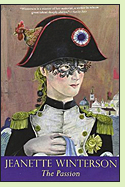The Passion
by Jeanette Winterson
Reviewed by Margaret Tomlinson

Passion is the subject of The Passion, from the nationalistic passion that leads young Henri to join Napoleon's army, to Napoleon's passion for chicken dishes that results in Henri's army job slaughtering chickens, to the passion of the Venetian boatman's daughter Villanelle for a married woman which, through a highly circuitous route, leads her to become a camp follower in the same army.
The novel woos readers with scenes of vivid strangeness painted in quick, bright brushstrokes: Napoleon "wishes his whole face were mouth to cram a whole bird." Henri remembers his farmer father "with two sacks ... full of blind moles, their whiskers still rough with dirt." Villanelle roams Venice on a festival night among "fire-eaters frothing at the mouth with yellow tongues" and midnight fireworks that break "the sky above St. Mark's ... into a million coloured pieces."
Amid the startling mosaic of story, the narrators drop insights about the vagaries of love: "Somewhere between fear and sex passion is," Villanelle tells us, and "Passion is not so much an emotion as a destiny." About soldiering, Henri says, "We began to believe that we were fighting this war so that we could go home.... Now that our hearts were gone there was no reliable organ to stem the steady tide of sentiment that stuck to our bayonets and fed our damp fires."
Truth can be bittersweet, as this novel is, and passion does not always, or perhaps even often, lead to happiness. Instead of immersing the reader in the characters' passions, this novel dissects them and lays them out - bare, odd, familiar - to be recognized and reflected upon. (1987; 160 pages)
More about The Passion at Powell's Books or Amazon.comOther novels set during the Napoleonic Wars:
The Free Fishers by John Buchan (1934), about Scottish fisherman who act as spies during the Napoleonic Wars. More info
Jonathan Strange and Mr. Norrell by Susanna Clarke (2004), a wryly humorous literary novel about British students and practitioners of magic during the time of Napoleon. More info
Stealing Athena by Karen Essex (2008), about the Countess of Elgin, who during the Napoleonic Wars charmed the Ottoman Empire's power brokers into allowing her husband to remove the sculptures (later known as the Elgin Marbles) from the Parthenon in Athens and transport them to England. More info
Cookbooks featuring chicken recipes:
Napoleon's Chicken: Recipes Fit for Emperors, Designed for Weekend Cooks by Bob Cotten (2011). More info
Fifty Shades of Chicken: A Parody in a Cookbook by F.L. Fowler (2012). More info
Five Fat Hens: A Guide for Keeping Chickens and Enjoying Delicious Meals by Tim Halket (2015). More info
Online:
Julia Child's Napoleon's Chicken, one of the more authentic chicken marengo recipes, recreated at the Get Real Cooking website.
Back to Novels of the Napoleonic Era
Back to Directory of Book Reviews